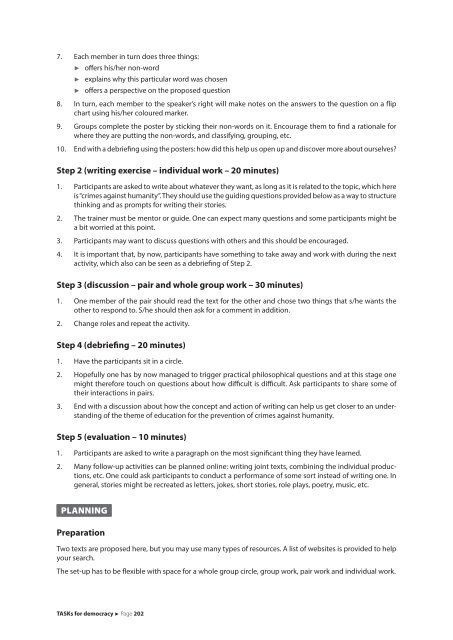TASKs for democracy
4NYw4W
4NYw4W
You also want an ePaper? Increase the reach of your titles
YUMPU automatically turns print PDFs into web optimized ePapers that Google loves.
7. Each member in turn does three things:<br />
<br />
<br />
offers his/her non-word<br />
explains why this particular word was chosen<br />
offers a perspective on the proposed question<br />
8. In turn, each member to the speaker’s right will make notes on the answers to the question on a flip<br />
chart using his/her coloured marker.<br />
9. Groups complete the poster by sticking their non-words on it. Encourage them to find a rationale <strong>for</strong><br />
where they are putting the non-words, and classifying, grouping, etc.<br />
10. End with a debriefing using the posters: how did this help us open up and discover more about ourselves?<br />
Step 2 (writing exercise – individual work – 20 minutes)<br />
1. Participants are asked to write about whatever they want, as long as it is related to the topic, which here<br />
is “crimes against humanity”. They should use the guiding questions provided below as a way to structure<br />
thinking and as prompts <strong>for</strong> writing their stories.<br />
2. The trainer must be mentor or guide. One can expect many questions and some participants might be<br />
a bit worried at this point.<br />
3. Participants may want to discuss questions with others and this should be encouraged.<br />
4. It is important that, by now, participants have something to take away and work with during the next<br />
activity, which also can be seen as a debriefing of Step 2.<br />
Step 3 (discussion – pair and whole group work – 30 minutes)<br />
1. One member of the pair should read the text <strong>for</strong> the other and chose two things that s/he wants the<br />
other to respond to. S/he should then ask <strong>for</strong> a comment in addition.<br />
2. Change roles and repeat the activity.<br />
Step 4 (debriefing – 20 minutes)<br />
1. Have the participants sit in a circle.<br />
2. Hopefully one has by now managed to trigger practical philosophical questions and at this stage one<br />
might there<strong>for</strong>e touch on questions about how difficult is difficult. Ask participants to share some of<br />
their interactions in pairs.<br />
3. End with a discussion about how the concept and action of writing can help us get closer to an understanding<br />
of the theme of education <strong>for</strong> the prevention of crimes against humanity.<br />
Step 5 (evaluation – 10 minutes)<br />
1. Participants are asked to write a paragraph on the most significant thing they have learned.<br />
2. Many follow-up activities can be planned online: writing joint texts, combining the individual productions,<br />
etc. One could ask participants to conduct a per<strong>for</strong>mance of some sort instead of writing one. In<br />
general, stories might be recreated as letters, jokes, short stories, role plays, poetry, music, etc.<br />
PLANNING<br />
Preparation<br />
Two texts are proposed here, but you may use many types of resources. A list of websites is provided to help<br />
your search.<br />
The set-up has to be flexible with space <strong>for</strong> a whole group circle, group work, pair work and individual work.<br />
<strong>TASKs</strong> <strong>for</strong> <strong>democracy</strong> Page 202


